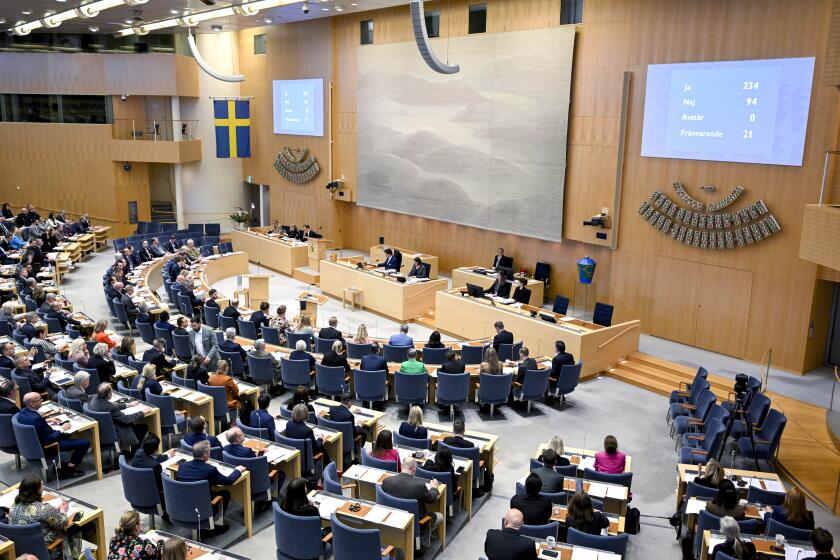Former Hussein supporters live in fear
First, the attackers beat the retired Baghdad municipality worker, his wife and their daughter in their home last weekend. Then they beheaded them.
The only clear motive people could think of for such brutality was that the dead man had belonged to Saddam Hussein’s Baath Party.
“They didn’t care if he was a good or bad person,” his cousin Abu Abdullah said a few days later. “His job had required him to be a Baathist. He was never into it like others. He never hurt anyone.”
Ahmed Jawad Hashim’s killing was a gruesome reminder of the dangers lurking for former members of the Baath Party at a time when “de-Baathification” legislation, meant to promote reconciliation among those purged from government, mostly Sunnis, and the country’s Shiite religious elite, slowly makes its way into law.
The fear of a grisly end at the hands of revenge-seeking Shiite militias, criminal gangs or even an old workplace rival is shared by many who belonged to the Baath Party, a hated symbol of state oppression that at its peak counted anywhere from 2 million to 6 million members -- including many Shiites such as Hashim who joined the party so they could advance professionally.
The order to banish officials belonging to the top levels of the Baath Party was U.S. overseer L. Paul Bremer III’s first decree after the 2003 invasion. In the years since, the Iraqi government’s de-Baathification committee insists that it has reinstated or given pensions to most of the 140,000 Iraqis fired under Bremer’s law, but observers and diplomats say the purges persisted, with people fired for political reasons or because they didn’t pay bribes to the right people.
Hashim, the retired engineer, had gone into hiding in 2003 after Hussein was ousted. But, encouraged by his friends to go back to work, he reappeared in Baghdad later that year. By all accounts, his story was the kind touted as proof by some U.S. and Iraqi officials that the commission welcomed people back.
Hashim returned to the waterworks department at the Baghdad municipality, where he stayed until his retirement four months ago.
After retiring, Hashim hadn’t received any warning that someone wanted him dead. He spent his days at street markets and visiting friends. “He had no fears. He was living a normal life,” said Abu Abdullah, who added that he worried about reprisals against the family.
Since Prime Minister Nouri Maliki’s “national unity” government was sworn in May 2006, one of his Cabinet’s goals has been to reform the de-Baathification process. But evidence of continued purges is clear.
One such case was Abdul Aziz Karagolly, a top official in the Agriculture Ministry. He was notified on July 25, 2006, that he had been fired by the de-Baathification commission. He believed he was dismissed because he did not belong to Shiite cleric Muqtada Sadr’s movement, which then controlled the ministry. Karagolly said he asked his minister to help, with no results.
“I don’t think they want any experienced people or Sunnis to be in the ministry,” he said.
His dismissal shocked peers who credited him with helping rebuild the ministry in the chaotic days after the war. “This country can ill afford a purge of talented and experienced people like Abdul Aziz who are willing to contribute everything to the reconstruction of Iraq,” said Roger Hartley, an Australian advisor to the Agriculture Ministry in 2003.
Although Karagolly wishes he could go back to the ministry, where he served for nearly 32 years, he thinks collecting his pension is his safest option. “I worry a lot about the militias who killed two director-generals at the Ministry of Agriculture and many of my dearest friends. So going back is a great risk,” Karagolly said Saturday.
The lack of compromise between political blocs in 2006 on the issue of the de-Baathification commission delayed any major strides toward a solution, and the controversial body continued to hunt former Baathists. In January, with barely 150 members of the 275-seat parliament present, the Accountability and Justice Law that would allow some Baathists back was passed.
But within days of its passage, the presidency council hesitated on ratifying the law. Vice President Tariq Hashimi, a Sunni, said the three-man presidency had objected to clauses in the legislation that banned anyone who had served in Hussein’s special security organs from working in the new forces.
Another contentious section involved members from the fourth-highest level of the Baath Party. The law would block them from serving in the country’s judiciary council or the foreign, interior and defense ministries.
High-ranking officials who had been granted waivers to return to work would be fired.
Hashimi said Saturday that the presidency council would submit amendments to parliament in the coming weeks but would not prevent the law from going into effect after today.
Another part of the legislation that has been criticized is the makeup of the new de-Baathification body. It is the same as the old one, just with a new name.
“The fact the committee remains would be among my main concerns. It was tied to charges of corruption and politicization -- and that is likely to continue,” said a U.S. diplomat who has worked in Iraq.
On the positive side, the new law will set up an appeals court, headed by judges, in contrast to the previous process, under which people could turn only to the commission to challenge dismissals.
The legislation also grants the right to work and receive pensions to Baathists who previously had no such rights, except by way of special waivers.
Its ultimate test will be how the Iraqi government enforces the measures.
“The new law is scarcely generous towards the Baath, but this may not matter if Iraq’s Shiites use it to exclude Sunnis regardless of their true alignment with the Baath, and do not continue to exclude far more Baathists than the law really calls for,” said Anthony Cordesman, an Iraq expert with the Washington-based Center for Strategic and International Studies.
But the dangers remain for those who were fired from their old jobs. They worry they might be punished for their old affiliations.
Salim Sabri, 54, married with eight children, used to work for the Kut municipality in the eastern province of Wasit but was fired after Hussein’s fall for being a Baathist. He decided it was safer for him to move to Baghdad. He sold his home in Kut to start a new life.
“No one would recognize me there,” he said.
Sabri doesn’t regret leaving. Some of his friends have been threatened, and others killed. Although he is glad the new law would make him eligible for a pension, he also thinks registering could prove fatal.
“I don’t want the pension and I don’t want to reveal what I used to be. I spoke to many of my former friends, and almost all of them agree with me on this point,” Sabri said. “A long chapter in my life has been closed.”
---
--
Times staff writers Caesar Ahmed, Saif Rasheed, Saif Hameed and Raheem Salman contributed to this report.
More to Read
Start your day right
Sign up for Essential California for news, features and recommendations from the L.A. Times and beyond in your inbox six days a week.
You may occasionally receive promotional content from the Los Angeles Times.






